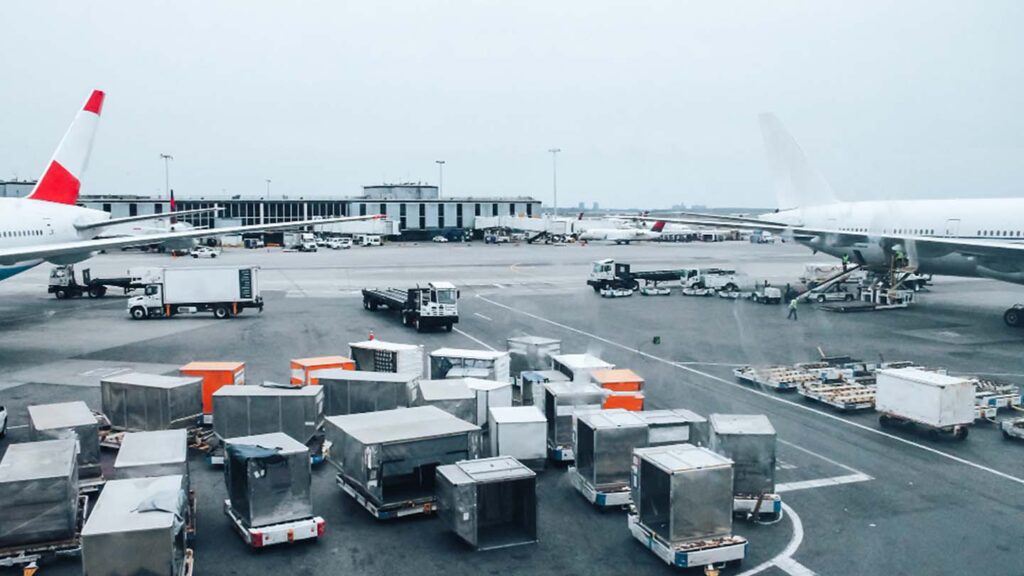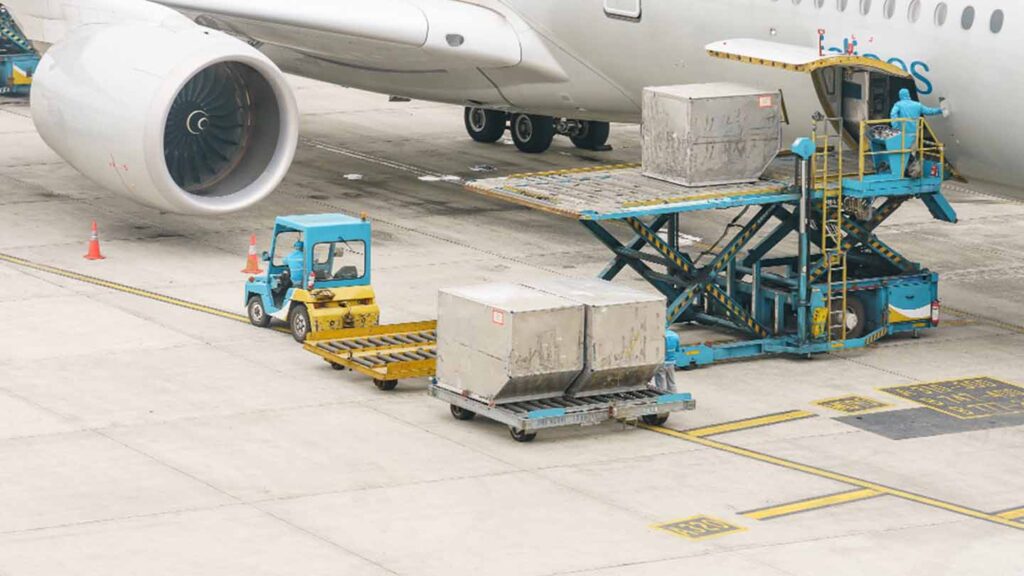Logistics is a critical part of the aviation industry, and many companies leverage logistics services to optimize their operations. The aviation industry relies on logistics to manage and deliver parts, equipment, people, and cargo efficiently worldwide.
What are Logistics Services?
The term ‘logistics’ describes the process of planning, implementing, and controlling the efficient flow of information, goods, and services from the point of origin to consumption. It encompasses everything from the movement of raw materials to the final delivery of finished products.
Logistics services are vital in ensuring that aircraft are maintained and operated safely and efficiently in the aviation industry. They encompass a wide range of activities, including flight planning, aircraft maintenance, cargo handling, and passenger transport.
Flight planning is a critical part of aviation logistics. It involves creating a detailed plan for an aircraft’s journey, taking into account factors such as weather conditions, airspace restrictions, and ground infrastructure.
Aircraft maintenance is another important aspect of aviation logistics. This includes scheduled servicing, repairs, and emergency response in the event of an accident or incident.
Cargo handling covers the transportation of freight and other goods on board aircraft. This can involve anything from loading and unloading baggage to transporting live animals or hazardous materials.
Finally, passenger transport forms a significant part of aviation logistics. This includes airside and ground-side operations, such as check-in, security screening, and passport control.
What is the role of Logistics Services in Aviation?

Logistics services play a vital role in aviation by ensuring that all aspects of the supply chain are coordinated and running smoothly. This includes everything from managing inventory and transportation to providing customer service and support. Without these critical functions, the aviation industry would be unable to function effectively.
From transportation and warehousing to inventory management and order fulfillment, logistics providers can tailor their services to meet each client’s specific needs.
An efficient logistics operation is essential for any business that relies on air transportation. It can help reduce costs, improve customer service, and keep your aircraft and other assets moving. Whether you are looking to outsource your entire logistics operation or need some assistance with specific tasks, working with a reputable provider can help you achieve your goals.
It’s Time To Re-Evaluate Your Logistics Support Programs: Why Good Customer Service Is The Key To Aviation Business?
The aviation industry is booming, with many companies looking to get themselves into this lucrative and dynamic part of the economy. But what is it that links these corporations together? Well, logistics connectors are the necessary suppliers of data links between company headquarters and their field operations.
As the aviation industry continues to grow, so does the demand for efficient and reliable logistics support services. To keep up with the competition, it’s important to re-evaluate your logistics support programs on a regular basis.
Here are some key facts to consider when determining whether or not your current program is meeting the needs of your customers:
– Are you getting a high level of customer service? Good customer service is essential in today’s business world. If customers are not happy with the level of service they’re receiving, they’ll take their business elsewhere.
– Is your program cost-effective? You need to make sure you’re getting the most bang for your buck when it comes to logistics support services. Make sure you compare rates and services offered by different providers before making a decision.
– Is your program efficient? Inefficiencies can lead to frustration on the part of both you and your customer. Make sure your program is streamlined and easy to use in order to avoid any headaches down the road.
By taking the time to re-evaluate your logistics support programs on a regular basis, you can ensure that you’re providing the best possible service to your customers. Keep these key points in mind, and you’ll be well on your way to maintaining a successful aviation business.
The Importance of Good Logistics Programs
Good customer service is the key to the aviation business. Many businesses now realize the importance of good logistics programs and the benefits they can offer. Here are some things to consider when re-evaluating your logistics support programs:
1. The first thing to consider is what your customers want and need. What do they value most? What would make their experience better? Consider all of this when designing your program.
2. Make sure your program is designed to meet the ever-changing landscape of the aviation world. Technology and customer demand change quickly, so your program must be agile enough to keep up.
3. Remember that good customer service isn’t just about meeting needs but also creating a positive experience. Think about how you can go above and beyond for your customers.
4. Finally, think about how you can use data to improve your program and track customer behavior and trends so you can anticipate their needs and exceed their expectations.
What Does the Aviation Industry Require?

The aviation industry has long been renowned for its high standards of customer service and its ability to meet the needs of its passengers and clients. In order to maintain this excellent reputation, the aviation industry requires a number of things from logistics support providers.
First and foremost, aviation businesses require prompt and efficient service. They need their logistics support providers to be able to pick up and deliver orders quickly and without any delays. Aviation businesses also require that their logistics support providers have a good understanding of the unique needs of the aviation industry. This includes having a good understanding of aircraft maintenance schedules and requirements, as well as being familiar with the various types of aircraft that are used in the aviation industry.
Another important requirement of the aviation industry is for its logistics support providers to have a strong focus on safety. Aviation businesses need to know that their products and services are being delivered safely and securely and that their logistics support providers are taking all necessary precautions to ensure this. This includes having comprehensive insurance coverages in place, as well as following all safety regulations and procedures closely.
Finally, aviation businesses require that their logistics support providers offer competitive pricing. In today’s tough economic climate, it is more important than ever for companies to get the best value for their money when it comes to outsourcing their logistics needs. Aviation businesses need to know that they are getting a good deal on the services they receive and that they are not paying more than they need to for these vital services.
Choosing a Service Provider for Your Logistic Support
There are many things to consider when choosing a service provider for the logistic support of your aviation business. The most important factor is good customer service. Here are some key facts to look for when selecting a service provider:
-The company should have a strong commitment to customer service. This means they should be readily available to answer questions and address concerns.
-They should have a track record of providing quality services. This includes on-time delivery, accurate invoicing, and attention to detail.
-They should be able to meet your specific needs. This may include having knowledgeable staff, adequate resources, and flexible scheduling.
-They should be reliable and cost-effective. This means they should have a good reputation and competitive pricing.
Tips for Optimizing Your Aircraft and Aviation Program
We all want to say that we offer great customer service, but what does that mean when it comes to logistics support programs for aircraft and aviation businesses?
In order to optimize your logistical support program, you’ll need to focus on a few key areas: communication, flexibility, and proactive planning.
Communication is key in any business relationship, but it’s especially important when working with aircraft and aviation businesses. Make sure that you’re clear about your expectations and what you need from your logistics provider. This will help avoid misunderstandings and ensure everyone is on the same page.
Flexibility is also important. Things can change quickly in the world of aviation, so you need to be able to adapt on the fly. Your logistics provider should be able to adjust their plans as needed in order to accommodate your changing needs.
Finally, proactive planning is essential. You don’t want to be caught off guard by a sudden change in demand or an unexpected problem. Work with your logistics provider to create contingency plans for various scenarios so that you’re always prepared.
By following these tips, you can be sure that you’re getting the most out of your logistical support program and providing excellent customer service to your clients.



